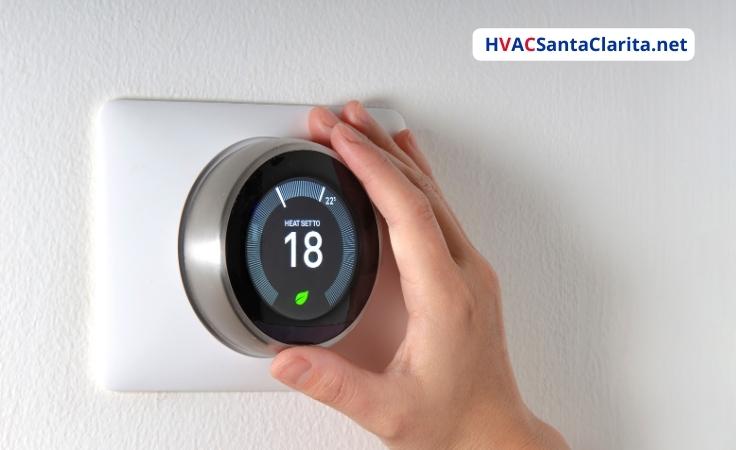What is the best AC temperature for asthma patients? Before we dive in, you need to have a central AC repair service contact on standby if you have an asthma patient in your household.

Asthma patients are aware of the challenges they face when breathing in extreme temperatures.

call 661-888-0248
Contact us 24/7 for HVAC services!
The thing is, what is normal for any other person can be extreme for an asthma patient.
One effective way to prevent asthma symptoms is to closely monitor the thermostat setting on the air conditioning unit. We know that constantly monitoring the AC temperature can be challenging, which is why we’re here.
In this article, we look at:
- What is the best room temperature for asthma patients?
- How to use your AC unit to help manage asthma symptoms?
- Other thoughts involve asthma and air conditioning.
Let’s go.
What Is The Best Room Temperature For Asthma?

To put it simply, breathing extremely cold and dry air is detrimental to asthma patients. Again, breathing hot, humid air is also terrible for asthmatic people. This makes it challenging for people to set their thermostats in a way that favors asthma patients.
Note: Doctors recommend an AC setting of approximately 70°F for individuals with asthma during the day. At night, the best AC temperature for sleeping is around 65 degrees. These temperatures can help an asthma patient achieve ease of breathing (1).
How does air temperature affect Asthma?
An asthma attack originates from the airways. This is why the quality of the air you inhale may directly trigger an asthma attack.
Check out below to see how air quality affects asthma symptoms.
Cold Air
First things first, viruses thrive in cold air. These viruses are notorious for triggering asthma symptoms.

Cold air will also restrict the airways, causing:
- difficulty breathing or shortness of breath,
- coughing tightness,
- wheezing.
Also, cold air is often dry. This results in increased mucus evaporation, which eventually leads to dry and irritated airways.
On the other side of the coin, to counter the quick evaporation of mucus, your body will start producing large amounts of mucus. This mucus is, however, thick and sticky. This can result in blockages or narrowing of the airways.
Additionally, cold air stimulates the production of histamine, a substance your body produces during an allergic reaction. Histamine production triggers wheezing and other asthma symptoms.
You are more likely to develop colds and flu during cold weather. These infections go hand in hand with triggering asthma symptoms.
Check out: Best temperature for the living room
Too Much Heat
To answer the FAQ: Can heat cause an asthma attack? Yes, it can.

When the air is too hot, it is a thriving environment for:
- dust mites,
- increased pollen count and air pollution levels
- mold spores.
These ruin the air quality and may trigger an asthma attack.
Additionally, hot air on its own can cause the airways to tighten.
Remember: Sudden changes in air temperature can be particularly detrimental for asthmatic patients. For example, if it is too hot outside and you enter a cold room, you are most likely to have an attack. This is why a programmable thermostat is recommended to set the air conditioning.
Best AC Temperature for Asthma: How Can Central AC Help with Asthma?
We have seen how too much heat and cold can trigger asthma symptoms.

Does AC help with asthma? 100% yes. In fact, air conditioning and heating systems are non-negotiable for asthma patients.
For instance, with the Santa Clarita air quality, a properly functioning AC is a necessity for asthmatics.
However, the result depends on how you use it.
How can you customize and manage your air conditioner to achieve the best air quality for asthma patients?
See below how you can manage your HVAC system for the best environmental factors.
Get a Programmable Thermostat
Asthma patients often worry about creating an environment with mild temperatures for their health, which is excellent. However, sudden temperature changes can worsen asthma symptoms.

This happens when you leave the house and return to a home that is too cold or too hot.
If you have a programmable thermostat, you can set it to the recommended AC temperature to cool your house before you arrive.
You can also set the thermostat to the recommended AC temperature for sleeping asthma patients around their bedtime.
Always have clean Air Filters
With Asthma, achieving the best room temperature is paramount. However, other environmental factors may affect you. In short, clean air is also essential for asthma patients.

Cleaner air means:
- minimum air pollution,
- less duct dirt,
- fewer irritants.
Maintaining clean air filters is one of the easiest ways to achieve optimal air quality. You need to religiously replace or clean your air filters every few months. Depending on your level of irritability, you may want to clean it more frequently.
Clean HVAC filters will block contaminants from circulating in your HVAC system.
Contact your HVAC technician to get help replacing or cleaning your air filters. After the first round and demonstration from your technician, you can do the cleaning and replacement on your own.
We, however, do not recommend that an asthma patient do it. The AC and furnace filters capture:
- pollen,
- duct,
- mold,
- bacteria,
- pet dander,
- duct mites.
You want to keep away from these, as they will trigger asthma symptoms.
Duct Cleaning Services For Clean Air Indoors
Another effective way to ensure your air conditioner is functioning properly is to hire air duct cleaning services.

Note: Constant heat and moisture pass through the ductworks. This makes it an excellent breeding ground for mold and mildew. If you do not get air duct cleaning on time, they will get into the air. This can be fatal for everyone, let alone asthma patients.
It is more risky for asthmatics. If you have an asthmatic in your household and encounter mold, we highly recommend installing a new HVAC unit.
Remember that dust, dust mites, and debris also build up in the air duct. They not only affect air temperature but also trigger asthma symptoms.
Get occasional air duct cleaning services from your local HVAC company. This will help your air conditioner work more effectively for you.
Search for “ductwork near me” to get duct cleaning services.
Best AC Temperature for Asthma: Is AC good for asthma patients?
As you have seen above, an air conditioner is not just good for asthma patients. It is necessary for them.
A properly functioning air conditioner has all the qualities that will help manage asthma symptoms:
- it ensures you have the best room temperature for asthma symptoms,
- it filters out pollutants and other forms of debris,
- regulates humidity levels indoors,
- It improves general air quality.
With all these qualities, you are assured of:
- fewer chances of an asthmatic attack,
- improved breathing.
Does an air conditioner affect Asthma?
Yes. An air conditioner can trigger an asthma attack. Simply put, how you use and maintain your air conditioner will determine whether it will make your life easier or not.
If you are asthmatic and stay in a room with air conditioning for so long, it can trigger an attack. You need a programmable thermostat to turn on and off when the desired temperature is achieved.
Also, poorly maintained air filters and ductwork can trigger an attack.
It’s all about how you use and maintain your air conditioning unit.
Many asthma sufferers ask, “Can air conditioning make asthma worse?”
And our answer is yes, it can if you do not maintain and use it well.
Best AC Temperature for Asthma: Frequently Asked Questions
With Asthma, setting the thermostat too low or too high can cause difficulty breathing and even an asthma attack. Simply put, you need to be vigilant with the thermostat setting if you or someone in your household has asthma.
We, therefore, answer some frequently asked questions (FAQs) to help you use your AC to the best benefit for asthmatic patients.
What temperature is best for Asthma?
Research recommends a temperature range of 68 to 72°F for asthma sufferers. This is ideal for both summer and winter. However, doctors consider a temperature around 65 degrees Fahrenheit to be the best sleeping temperature for Asthma.
What Temperature is too Cold for Asthma patients?
For Asthma patients, it is recommended not to go way below 68 degrees Fahrenheit. However, you do not want to go below 50 degrees Fahrenheit, as this will be problematic.
If the temperature drops below 10°F, it is recommended that asthma patients stay indoors. This is not the best weather for asthma patients to go out (2).
Can asthma patients sleep with an AC?
Yes, asthma patients can sleep with an AC on. It is recommended for them to do. If temperatures drop or rise while you sleep, your AC unit should step in. This way, you will always have the ideal air temperature and fewer chances of attacks at night.
This means that you should ensure your AC is running smoothly, with no issues such as blowing hot air.
Does Air conditioning trigger Asthma?
Yes, air conditioning can trigger asthma symptoms. The only means to escape this is to be keen and vigilant with your air conditioning maintenance. This way, you are always assured of achieving the best air temperatures when the temperatures shoot high or drop low.
Hopefully, this answers the FAQ: Is air conditioning bad for asthma? It all depends on how you use and maintain it.
Is a fan better for Asthma?
For asthma patients, if you have to choose between an air conditioner and a fan, always go for an air conditioner.
A fan is heavy on circulating dust, pollen and other allergens, which may trigger an asthma attack.
How to maintain my AC to prevent Asthma attacks?
Here are some amazing ways to maintain your air conditioner in the best interest of asthma patients:
- constantly ensure your thermostat is functioning well,
- regularly change your air filters,
- occasionally clean your ductwork.
These are great ways to reduce indoor asthma triggers, such as:
- very cold temperatures,
- air pollution,
- damp and humid environments.
Final Thoughts on the Best AC Temperature for Asthma
It goes without saying that the correct temperature is ideal for individuals with asthma. If you want to achieve the ideal room temperature for Asthma, it is no secret that you cannot do without a properly functioning central air conditioner.
With an air conditioner, you are assured of no more extreme temperatures that may cause asthma attacks. Additionally, an air conditioning system enables you to maintain proper indoor humidity levels and improve indoor air quality. What more can you ask for to lessen asthma attacks?
Sources
https://www.healthline.com/health/best-room-temperature-for-asthma
https://greatist.com/health/best-room-temperature-for-asthma
